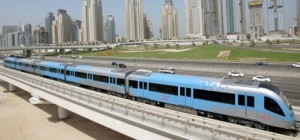By Muzaffar Rizvi www.khaleejtimes.com
The major infrastructure projects and investments in transport sector will expedite the recovery in Dubai real estate sector, a study says.
 The completion of world-class infrastructure and a business-friendly environment over the last two years will be among the main factors behind the creation of more demand for
Dubai real estate.
The completion of world-class infrastructure and a business-friendly environment over the last two years will be among the main factors behind the creation of more demand for
Dubai real estate.
The study further reveals that remarkable transport infrastructure investments such as Dubai Metro Green Line and the major extensions of Dubai International Airport will increase the attractiveness of the Emirate and the eventual rebound of its real estate market.
“Dubai’s real estate sector will gradually recover with a lag to the recovery in the domestic and global economy, even though it is unlikely to return to pre-crisis sales or rental growth rates in the foreseeable future,” according to a recent study by Dubai Chamber of Commerce and Industry.
Thierry Loue, Chief Executive Officer of Jones Lang Lasalle (MENA), said real estate in Dubai will bounce back soon due to strong demand emerges in almost all segments of the sector. “Dubai as a destination is highly recognised and it will emerge strongly with the positive developments in the economy,” he said.
He said Dubai is a major beneficiary of ongoing unrest in the region as tourist, trade visitors, investors returned to the emirate due to instability in the region. “Dubai attract so many people from Saudi Arabia and Kuwait due to unrest in Bahrain, Egtpt and other parts of the region and it would benefit the emirate due to its excellent infrastructure in real estate and hospitality sectors,” Thierry Loue said.
The chamber study further said despite current challenges, Dubai, as the region’s financial and business hub will continue to provide attractive investment opportunities regionally.
“Dubai has already laid down solid world-class infrastructure and an investor-friendly business environment, and as such these unique conditions will enable Dubai in the medium term to provide opportunities for investors with long-term objectives to enter the market and acquire valuable assets at a discounted value,” the study said.
“Recovery and sustainable future growth of Dubai’s real estate market is subject to some positive changes in market regulations and implementation of existing laws that can ensure transparency by putting in place the appropriate disclosure measures,” it added.
Massive new supply
The Dubai Chamber of Commerce and Industry study also said the real estate sector will remain under stress due to the onset of massive new supply.
It reveals that prices in Dubai’s real estate market have declined for the last two years due to oversupply in residential units.
This is also seen as the main factor behind further declines in rents and prices of properties according to experts in the local real estate market.“A robust rebound is expected at a slow pace as it may still take 2011 and the first quarter of 2012 for the sector prices to bottom out,” the study says.
Based on the price index and supply of units of Dubai’s residential real estate sub-sector in 2010 and its outlook in the short term, published by Colliers International and Jones Lang LaSalle and others, the study reveals that world-class infrastructure and a business-friendly environment will boost the demand Dubai’s house price index registered a one per cent increase in fourth quarter of 2010 compared to third quarter of 2010. On an annual basis, the index witnessed an overall decline of about six per cent in value when compared against fourth quarter of 2009.
The blended average house price for Q4 of 2010 was approximately Dh961 per square feet compared to Dh1,022 per square feet in Q4 of 2009.
Market supply demand trends
The total supply percentage share of villas and apartments in Dubai’s residential market is composed of about 79 per cent apartments and 21 per cent villas.
According to Jones Lang LaSalle, in 2010 approximately 36,000 residential units were completed, bringing the total residential stock to around 309,301 units by the end of the year.
In 2011, it is expected that about 25,545 units will be completed, implying that the new supply of residential properties in Dubai is expected to slow down by about 30 per cent compared to 2010.
According to the same source, major residential projects have already started and expected to be completed in first half of 2012.
From the demand side, the year-on-year Dubai residential numbers have decreased by 53 per cent and their corresponding transactions value has decreased by 65 per cent for the period between Q3 of 2009 to Q4 of 2010.
Apartments, villas price trends
The overall apartment index remained unchanged in Q4 of 2010 compared to Q3 of 2010, following a negative percentage change for the last quarters in a row. Transactions of apartments increased by 16 per cent for the same period under investigation. On an annual basis, the overall apartment index declined by five per cent in Q4 of 2010 compared to Q4 of 2009.
The biggest drop in apartment lease rates was once again recorded for smaller unit types – studios and one-bedroom units.
The villa market has closely mirrored the pattern of the apartments market during Q4 of 2010 with rates decreased by 3.3 per cent. On an annual basis, the drop was just two per cent, with the smaller villa sizes of two and three bedroom units witnessing the biggest reductions.
Diminishing lease and occupancy rates have resulted in some landlords being willing to absorb service charges on behalf of the tenants, whilst others are offering rent-free periods as an incentive.
Other landlords are offering rates of 10 per cent to 12 per cent below prevailing market levels in order to secure tenants willing to pay their rent a full year in advance.



















